cant-, chant-
(Latin: sing, singing; a song)
Someone who says a word or a phrase many times in a rhythmic way; usually, loudly and with other people: "Matthew was a chanter in Latin during the Catholic Mass."
A song sung by sailors as they were working or a rhythmical work song originally sung by sailors.
1. A rooster, especially in fairy tales; so called from the clearness or loudness of his voice in crowing.
2. Etymology: from about 1300, which came from Old French chante-cler, "sing-loud"; a name of a rooster in medieval stories of "Reynard the Fox".
2. Etymology: from about 1300, which came from Old French chante-cler, "sing-loud"; a name of a rooster in medieval stories of "Reynard the Fox".
1. A melody that is sung or played higher than the main melody of a piece of music.
2. An ornamental melody or counterpoint sung or played above a theme; or the highest part sung in a musical part.
3. A lengthy discourse on a subject: "The politician tended to make descants that were too long and complicated; when a shorter, to-the-point, answer to questions from the audience would be much more acceptable."
4. Etymology: from about 1380, from Anglo-French deschaunt; from Medieval Latin (as written and spoken about 700 to 1500) discantus, "a refrain, part-song"; from Latin dis-, "asunder, apart" + cantus, "song" from the past participle of canere, "to sing".
2. An ornamental melody or counterpoint sung or played above a theme; or the highest part sung in a musical part.
3. A lengthy discourse on a subject: "The politician tended to make descants that were too long and complicated; when a shorter, to-the-point, answer to questions from the audience would be much more acceptable."
4. Etymology: from about 1380, from Anglo-French deschaunt; from Medieval Latin (as written and spoken about 700 to 1500) discantus, "a refrain, part-song"; from Latin dis-, "asunder, apart" + cantus, "song" from the past participle of canere, "to sing".
The spelling was partly Latinized in the 16th century. It originally meant, "counterpoint"; the sense of "talk at length" was first recognized in 1649.
disenchant (verb), disenchants; disenchanted; disenchanting
1. To make someone stop believing that something, or somebody, is worthwhile, right, or deserving of support.
2. To free someone from a belief: "Joe was disenchanted from the magic spell when he realized how it was a trick and not a real situation."
3. To rid of, or to free from, enchantment, illusion, credulity, etc.
4. Etymology: from about 1586, from Middle French (language as written and spoken about 1400 to 1600) desenchanter, from des-, "dis-" + enchanter, "to enchant" (from Middle English enchanten, from Old French enchanter, from Latin incantre, "to utter an incantation, to cast a spell", from en-, in-, "against" + cantre, "to sing".
2. To free someone from a belief: "Joe was disenchanted from the magic spell when he realized how it was a trick and not a real situation."
3. To rid of, or to free from, enchantment, illusion, credulity, etc.
4. Etymology: from about 1586, from Middle French (language as written and spoken about 1400 to 1600) desenchanter, from des-, "dis-" + enchanter, "to enchant" (from Middle English enchanten, from Old French enchanter, from Latin incantre, "to utter an incantation, to cast a spell", from en-, in-, "against" + cantre, "to sing".
disenchanted (adjective), more disenchanted, most disenchanted
1. A feeling of disappointment regarding someone or something that was previously admired, respected, or believed: "Many members of the political group have a growing disenchantment with the leadership."
2. Etymology: from obsolete French desenchanter, from Old French, "to break a spell" from des-, dis-, "apart, away from" + enchanter, "to enchant" or "to put a magic spell upon".
2. Etymology: from obsolete French desenchanter, from Old French, "to break a spell" from des-, dis-, "apart, away from" + enchanter, "to enchant" or "to put a magic spell upon".
Something that causes, or that could cause, a person to decide not to do something: "Steve tried to subscribe to a certain website, but the complicated application process was a disincentive."
enchant (verb), enchants; enchanted; enchanting
1. To charm, to delight, or to captivate someone.
2. To put someone or something under a magic spell or influence.
3. To delight to a high degree or to attract and to hold the attention of someone, or something, by being interesting, pretty, etc.: "Visitors will be enchanted, captivated, and charmed by the beauty of the place."
2. To put someone or something under a magic spell or influence.
3. To delight to a high degree or to attract and to hold the attention of someone, or something, by being interesting, pretty, etc.: "Visitors will be enchanted, captivated, and charmed by the beauty of the place."
1. Someone who uses spells or magic; such as, a sorcerer or a wizard.
2. A person who delights or fascinates a person or people.
2. A person who delights or fascinates a person or people.
enchantingly (adverb), more enchantingly, most enchantingly
Descriptive of the power to delight or to charm: "When Eloise performs concerts, she sings enchantingly wonderful songs."
1. Something that delights or captivates.
2. The act of producing certain wonderful effects by the invocation or aid of demons, or the agency of certain supposed spirits; the use of magic arts, spells or charms; incantation.
3. An irresistible influence or an overpowering influence of delight.
4. Etymology: from about 1297, from Old French enchantement, from enchanter, "bewitch, charm"; from Latin incantare, literally, "to chant (a magic spell) upon"; from in-, "upon, into" + cantare, "to sing".
2. The act of producing certain wonderful effects by the invocation or aid of demons, or the agency of certain supposed spirits; the use of magic arts, spells or charms; incantation.
3. An irresistible influence or an overpowering influence of delight.
4. Etymology: from about 1297, from Old French enchantement, from enchanter, "bewitch, charm"; from Latin incantare, literally, "to chant (a magic spell) upon"; from in-, "upon, into" + cantare, "to sing".
1. A woman who is charming, delightful, and of great charm or fascination.
2. A woman who casts spells or who practices magic; a sorceress.
2. A woman who casts spells or who practices magic; a sorceress.
1. A ritual recitation, or chanting, of words or sounds believed to have magical effects: The girls were whispering incantations as they moved in circles, hoping to have visions of their future husbands!
2. A set of words spoken or chanted as a supposedly magic spell: The preacher was trying to produce a miracle by using incantations.
3. Etymology: from about 1390, which came from Old French incantation, from Latin incantationem, incantatio, "art of enchanting"; from incantus, past participle of incantare, "to bewitch, to charm"; literally, "to sing spells".
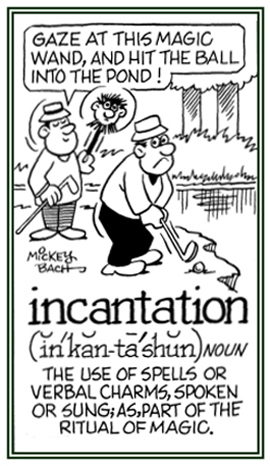
© ALL rights are reserved.
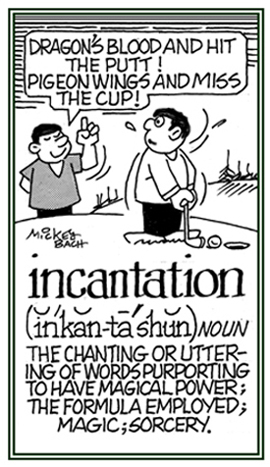
© ALL rights are reserved.
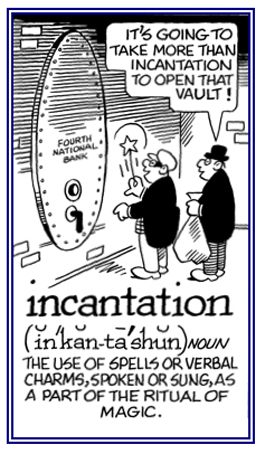
© ALL rights are reserved.
Go to this Word A Day Revisited Index
2. A set of words spoken or chanted as a supposedly magic spell: The preacher was trying to produce a miracle by using incantations.
3. Etymology: from about 1390, which came from Old French incantation, from Latin incantationem, incantatio, "art of enchanting"; from incantus, past participle of incantare, "to bewitch, to charm"; literally, "to sing spells".



Go to this Word A Day Revisited Index
so you can see more of Mickey Bach's cartoons.
1. Something that encourages or motivates someone to do something or to work harder: The rising cost of electricity provides a strong incentive to turn appliances off when they are not needed.
2. Something, such as the fear of punishment or the expectation of reward, that induces action or motivates an effort: The fear of having to go to the principal's office after school was a strong incentive for Gertrude to follow the rules of the playground.
3. Etymology: from about 1432, from Late Latin incentivum, the noun use of neuter Latin incentivus, "setting the tune"; in Late Latin "inciting", from the stem of incinere, "to strike up, to sound, to sing"; from in-, "in, into" + canere, "to sing".
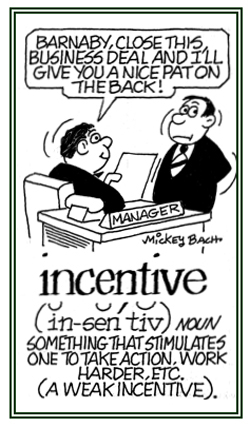
© ALL rights are reserved.
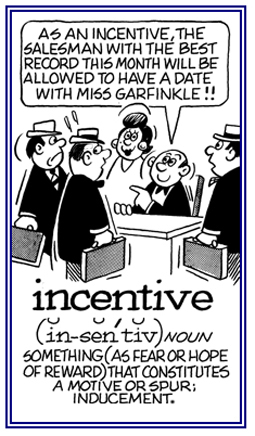
© ALL rights are reserved.
Go to this Word A Day Revisited Index
2. Something, such as the fear of punishment or the expectation of reward, that induces action or motivates an effort: The fear of having to go to the principal's office after school was a strong incentive for Gertrude to follow the rules of the playground.
3. Etymology: from about 1432, from Late Latin incentivum, the noun use of neuter Latin incentivus, "setting the tune"; in Late Latin "inciting", from the stem of incinere, "to strike up, to sound, to sing"; from in-, "in, into" + canere, "to sing".
The sense, or meaning, is influenced by association with Latin incendere, "to kindle, to set on fire"; however, keep in mind that incentive does NOT come from this etymological source.




